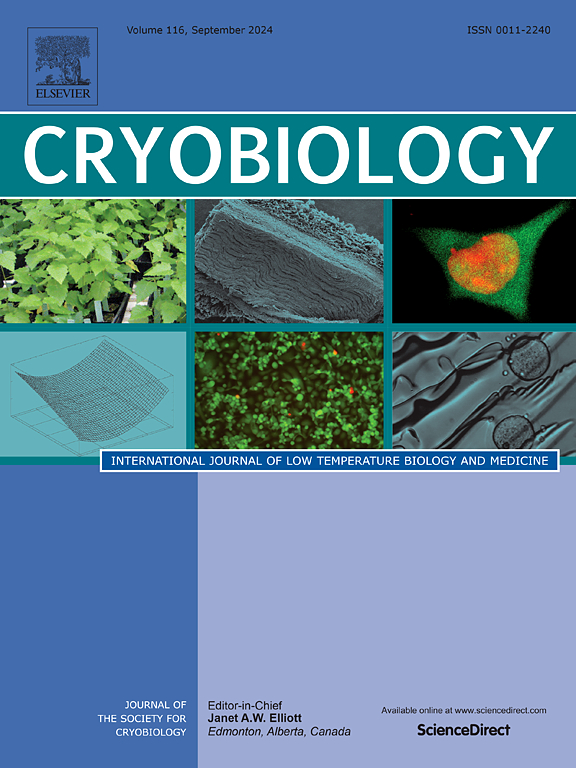Effects of growth factor supplementation on the proliferation of cryopreserved canine amniotic membrane stem cells
IF 2.1
3区 生物学
Q2 BIOLOGY
引用次数: 0
Abstract
Amniotic membrane-derived mesenchymal stem cells (AM-MSCs) possess significant proliferative and multilineage differentiation potential. However, prolonged in vitro culture and cryopreservation can negatively impact cell viability and expansion capacity. This study investigates the effects of growth factor supplementation on the proliferation of advanced-passage canine AM-MSCs (cAM-MSCs) before and after cryopreservation. cAM-MSCs were isolated from late-gestation canine fetuses, cultured in vitro, and supplemented with different growth factors: fibroblast growth factor 2 (FGF-2), fibroblast growth factor 4 (FGF-4), platelet-derived growth factor-ββ (PDGF-ββ), vascular endothelial growth factor-β (VEGF-β), and transforming growth factor-β1 (TGF-β1), with a control group receiving no supplementation. Growth curves were analyzed before and after cryopreservation, and gene expression of SCAPER (mitotic potential) and TP53 (apoptosis) was quantified using qPCR. As result, supplementation with FGF-2, FGF-4, and PDGF-ββ significantly enhanced cAM-MSC proliferation without altering the expression of proliferation-associated genes. These findings suggest that growth factor supplementation may be a viable strategy to improve cell viability in long-term culture and post-thaw recovery.
补充生长因子对冷冻保存犬羊膜干细胞增殖的影响
羊膜源间充质干细胞(AM-MSCs)具有显著的增殖和多系分化潜力。然而,长时间体外培养和低温保存会对细胞活力和扩增能力产生负面影响。本研究探讨了添加生长因子对犬AM-MSCs (cAM-MSCs)冷冻保存前后增殖的影响。从妊娠晚期犬胎儿中分离cAM-MSCs,体外培养,添加不同的生长因子:成纤维细胞生长因子2 (FGF-2)、成纤维细胞生长因子4 (FGF-4)、血小板衍生生长因子-ββ (PDGF-ββ)、血管内皮生长因子-β (VEGF-β)和转化生长因子-β1 (TGF-β1),对照组不添加。分析冷冻保存前后的生长曲线,并采用qPCR定量检测SCAPER(有丝分裂电位)和TP53(细胞凋亡)的基因表达。结果,补充FGF-2、FGF-4和PDGF-ββ显著增强cAM-MSC增殖,而不改变增殖相关基因的表达。这些发现表明,在长期培养和解冻后恢复中,补充生长因子可能是提高细胞活力的可行策略。
本文章由计算机程序翻译,如有差异,请以英文原文为准。
求助全文
约1分钟内获得全文
求助全文
来源期刊

Cryobiology
生物-生理学
CiteScore
5.40
自引率
7.40%
发文量
71
审稿时长
56 days
期刊介绍:
Cryobiology: International Journal of Low Temperature Biology and Medicine publishes research articles on all aspects of low temperature biology and medicine.
Research Areas include:
• Cryoprotective additives and their pharmacological actions
• Cryosurgery
• Freeze-drying
• Freezing
• Frost hardiness in plants
• Hibernation
• Hypothermia
• Medical applications of reduced temperature
• Perfusion of organs
• All pertinent methodologies
Cryobiology is the official journal of the Society for Cryobiology.
 求助内容:
求助内容: 应助结果提醒方式:
应助结果提醒方式:


